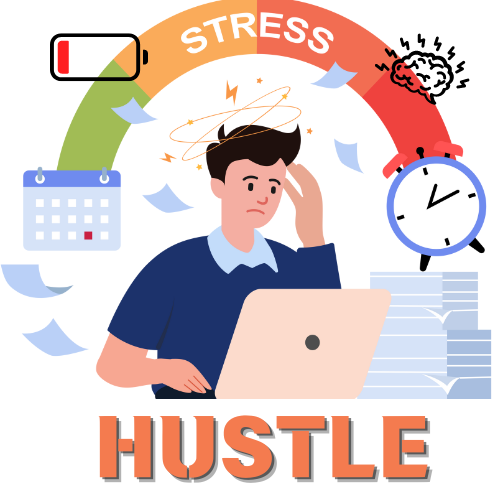
Cultural historian and social critic Morris Berman argues one of America’s greatest offenses is fostering a “culture of hustle.” While hustling can be invigorating and rewarding, it is ultimately proved to be hollow, destructive and damaging.
Hustle culture is a philosophy adopted by many modern American workplaces in which hard work and long hours are emphasized as the only route to success. The hustle culture’s philosophy asserts that those who are willing to outwork everyone around them will find true success and satisfaction.
In “The Burnout Society,” author Byung-Chul Han picks apart the “achievement society” and “positively imperative” in which individuals are progressively driven to excel and overachieve. They feel the need to project their picture-perfect image of success even amidst extreme pressure and exhaustion. Han argues the rise of digital technologies and social media platforms worsens the problem, blurring the lines between work and leisure.
Like any widespread movement, hustle culture has been marketed and glorified over various social media platforms, the most prominent one being TikTok. Popular influencers are seen posting “day in the life” short-form videos in which their days include waking up at 5 a.m. and non-stop productive activities until bed. The videos are filmed in a way that is aesthetically pleasing, ultimately romanticizing an overworked lifestyle.
The portrayal of a productive daily lifestyle on social media platforms ultimately does more harm than good.
Student athlete Sophia Foad has taken particular notice of the way these videos leave her feeling. “When I see videos on my feed of other people being productive I often feel like I’m not doing enough. Seeing those videos makes me feel guilty for taking breaks and after scrolling I feel lazy and unproductive,” expressed Foad.
Beneath the face of hustle culture lies a complex interplay of American societal pressures feeding the nonstop pursuit to success. In a society where wealth and luxury equal success and workers aren’t sufficiently sustained by their day jobs, many Americans are overworking themselves.
However, this stressful lifestyle isn’t the case for many other cultures around the world, most notably European culture. American work culture is rapid, aggressive and constant while Europe values a slower lifestyle. Employees work around 35 hours a week with two hour daily lunch breaks and many workers taking the majority of August off for relaxation. Europeans highly value work-life balance and separation between their personal life and the workplace, while Americans often interconnect their identity with their profession.
Sarah Russell, a psychology teacher and distinguished traveler, reflected on the stark differences between the two work cultures. “American culture values competition and individualism more than many of our European counterparts. This helps to explain why rest, vacation, and leave are more normalized and valued in European countries. In the United Kingdom, full-time workers are entitled to over five weeks of vacation. In the U.S., that average amount of vacation is two weeks. These systemic differences highlight how different cultures view the importance of rest,” said Russell.
Although feeding into the non-stop habit of American hustle culture may flourish individual success in the workplace, it diminishes individual happiness. Despite the wide popularity of the go-go mindset, it has been directly linked to many mental health concerns including anxiety, depression and debilitating stress. Due to crippling work-related stress, 65% of American employees claimed they feel burnt out.
Counselor Ellie Thomas advises taking a break to reduce feelings of burnout. “It’s healthy to recognize the signs of workplace burnout, and if taking a mental health day to relax, recharge or catch up on sleep helps reduce stress and reduce the feeling of burnout. It’s an excellent thing to use occasionally,” stated Thomas.
Breaking away from American hustle culture can be an extremely daunting task. Ultimately, it requires a shift in mindset and a willingness to prioritize self-care over endless productivity.








